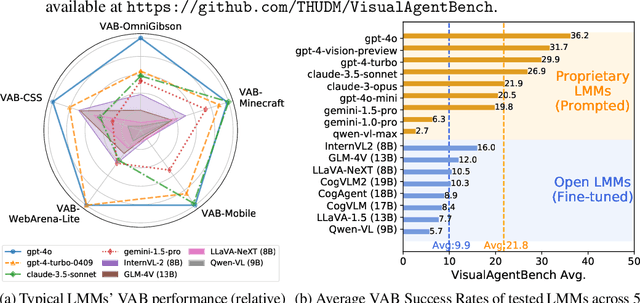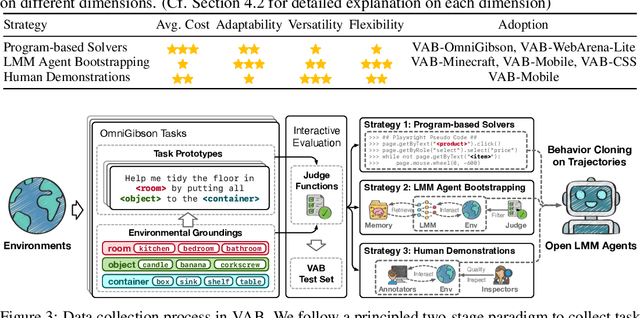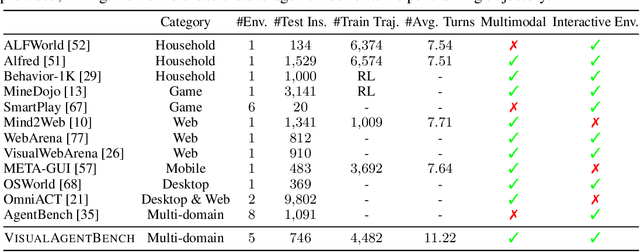Siyi Cheng
AndroidLab: Training and Systematic Benchmarking of Android Autonomous Agents
Oct 31, 2024



Abstract:Autonomous agents have become increasingly important for interacting with the real world. Android agents, in particular, have been recently a frequently-mentioned interaction method. However, existing studies for training and evaluating Android agents lack systematic research on both open-source and closed-source models. In this work, we propose AndroidLab as a systematic Android agent framework. It includes an operation environment with different modalities, action space, and a reproducible benchmark. It supports both large language models (LLMs) and multimodal models (LMMs) in the same action space. AndroidLab benchmark includes predefined Android virtual devices and 138 tasks across nine apps built on these devices. By using the AndroidLab environment, we develop an Android Instruction dataset and train six open-source LLMs and LMMs, lifting the average success rates from 4.59\% to 21.50\% for LLMs and from 1.93\% to 13.28\% for LMMs. AndroidLab is open-sourced and publicly available at \url{https://github.com/THUDM/Android-Lab}.
AutoGLM: Autonomous Foundation Agents for GUIs
Oct 28, 2024



Abstract:We present AutoGLM, a new series in the ChatGLM family, designed to serve as foundation agents for autonomous control of digital devices through Graphical User Interfaces (GUIs). While foundation models excel at acquiring human knowledge, they often struggle with decision-making in dynamic real-world environments, limiting their progress toward artificial general intelligence. This limitation underscores the importance of developing foundation agents capable of learning through autonomous environmental interactions by reinforcing existing models. Focusing on Web Browser and Phone as representative GUI scenarios, we have developed AutoGLM as a practical foundation agent system for real-world GUI interactions. Our approach integrates a comprehensive suite of techniques and infrastructures to create deployable agent systems suitable for user delivery. Through this development, we have derived two key insights: First, the design of an appropriate "intermediate interface" for GUI control is crucial, enabling the separation of planning and grounding behaviors, which require distinct optimization for flexibility and accuracy respectively. Second, we have developed a novel progressive training framework that enables self-evolving online curriculum reinforcement learning for AutoGLM. Our evaluations demonstrate AutoGLM's effectiveness across multiple domains. For web browsing, AutoGLM achieves a 55.2% success rate on VAB-WebArena-Lite (improving to 59.1% with a second attempt) and 96.2% on OpenTable evaluation tasks. In Android device control, AutoGLM attains a 36.2% success rate on AndroidLab (VAB-Mobile) and 89.7% on common tasks in popular Chinese APPs.
VisualAgentBench: Towards Large Multimodal Models as Visual Foundation Agents
Aug 12, 2024



Abstract:Large Multimodal Models (LMMs) have ushered in a new era in artificial intelligence, merging capabilities in both language and vision to form highly capable Visual Foundation Agents. These agents are postulated to excel across a myriad of tasks, potentially approaching general artificial intelligence. However, existing benchmarks fail to sufficiently challenge or showcase the full potential of LMMs in complex, real-world environments. To address this gap, we introduce VisualAgentBench (VAB), a comprehensive and pioneering benchmark specifically designed to train and evaluate LMMs as visual foundation agents across diverse scenarios, including Embodied, Graphical User Interface, and Visual Design, with tasks formulated to probe the depth of LMMs' understanding and interaction capabilities. Through rigorous testing across nine proprietary LMM APIs and eight open models, we demonstrate the considerable yet still developing agent capabilities of these models. Additionally, VAB constructs a trajectory training set constructed through hybrid methods including Program-based Solvers, LMM Agent Bootstrapping, and Human Demonstrations, promoting substantial performance improvements in LMMs through behavior cloning. Our work not only aims to benchmark existing models but also provides a solid foundation for future development into visual foundation agents. Code, train \& test data, and part of fine-tuned open LMMs are available at \url{https://github.com/THUDM/VisualAgentBench}.
 Add to Chrome
Add to Chrome Add to Firefox
Add to Firefox Add to Edge
Add to Edge